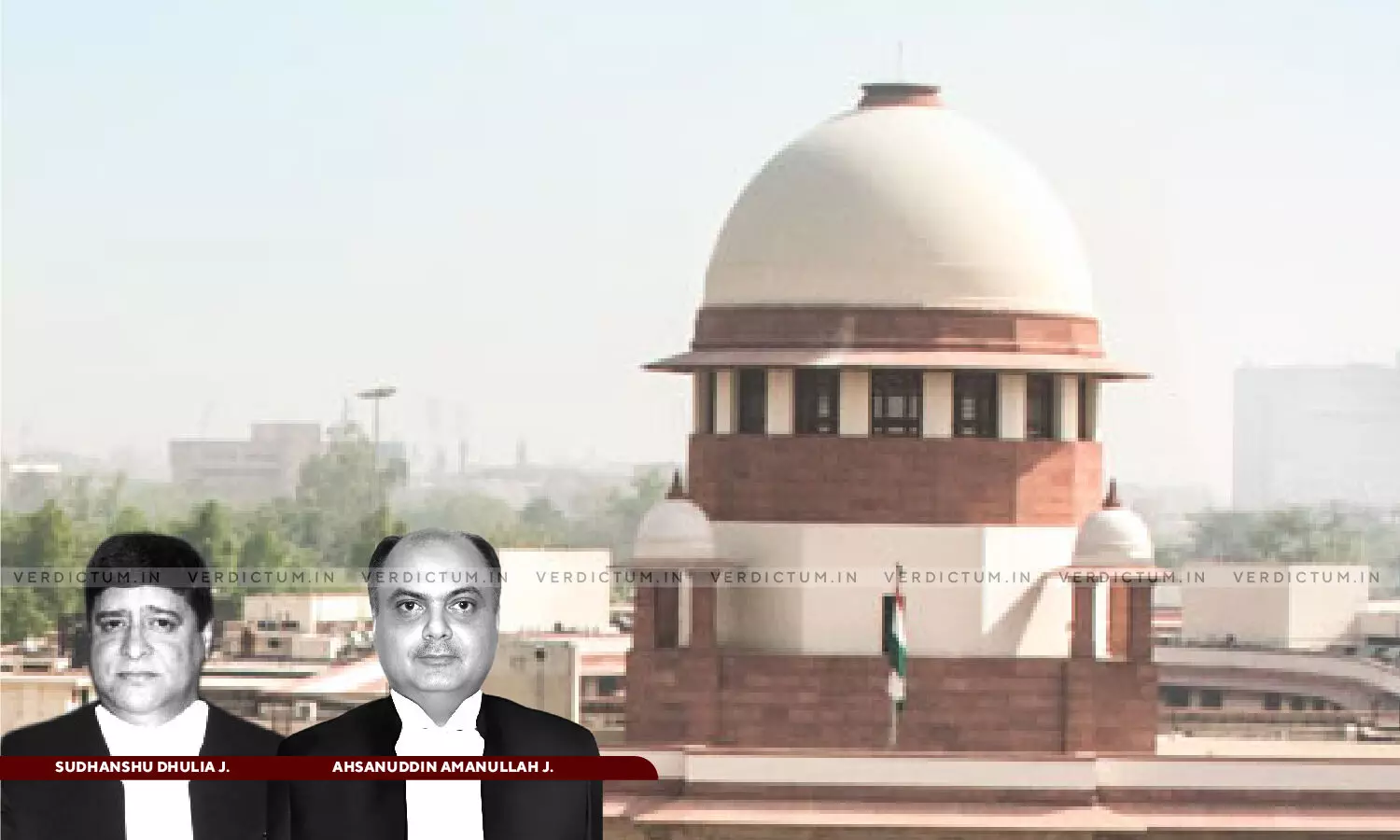
Justice Sudhanshu Dhulia, Justice Ahsanuddin Amanullah, Supreme Court
Cognizance Order By Magistrate Cannot Be Faulted Only Because It’s Not A Reasoned Order: Supreme Court
 |
|The Supreme Court set aside the Order of the High Court that had set aside a cognizance Order under the SC/ST Act by the Additional Judicial Commissioner.
The Supreme Court has reiterated that the Order of the Magistrate taking cognizance cannot be faulted only because it is not a reasoned Order.
The Court set aside the Order of the Jharkhand High Court that had set aside a cognizance Order under the Scheduled Castes and the Scheduled Tribes (Prevention of Atrocities) Act, 1989 (SC/ST Act) by the Additional Judicial Commissioner. The Court reiterated that “If a Magistrate is to write detailed orders at different stages merely because the counsel would address arguments at all stages, the snail-paced progress of proceedings in trial courts would further be slowed down.”
A Bench of Justice Sudhanshu Dhulia and Justice Ahsanuddin Amanullah remarked, “Perusal of the entire gamut of the pleadings of the Appellants does not disclose any categorical statement to the effect that during investigation by the police, no evidence has emerged to warrant taking of cognizance, much less against the Appellants. The only averment which has been made is that the Trial Court had not recorded the prima facie material against the Appellants because it does not exist. This is too simplistic an argument and does not shift the burden from the Appellants of taking a categorical stand that no material whatsoever for taking cognizance is available in the police papers/case diary against the Appellants.”
AOR Arup Banerjee appeared for the Appellants, while AOR Madhusmita Bora represented the Respondents.
Brief Facts
An FIR was filed by the second wife of the deceased and the Appellants, alleging that the deceased, posing as unmarried, married her in 1990 and had three children with her. She further claimed that the deceased and the Appellants harassed her and eventually ousted her from her house.
The Additional Judicial Commissioner took cognizance of the case against the deceased and the Appellants. The High Court, in the Impugned Judgment, set aside this cognizance Order, stating that the order did not disclose the prima facie material against the Appellants, and remitted the matter for passing Order afresh.
Court’s Reasoning
The Supreme Court explained that “the Court would pause to delve on what is the scope of the exercise of application of mind on the police papers/case diary for deciding as to whether to take cognizance or not - it has only to be seen whether there is material forthcoming to indicate commission of the offence(s) alleged. The concerned Court is not empowered to go into the veracity of the material at that time. That is why, the law provides for a trial where it is open to both the parties i.e., the prosecution as well as the defence to lead evidence(s) either to prove the materials which have come against the accused or to disprove such findings.”
The Bench referred to the decision in Bhushan Kumar v. State (NCT of Delhi) (2012), wherein the Supreme Court held that “an order of the Magistrate taking cognizance cannot be faulted only because it was not a reasoned order.” It was further held, “Time and again it has been stated by this Court that the summoning order under Section 204 of the Code requires no explicit reasons to be stated because it is imperative that the Magistrate must have taken notice of the accusations and applied his mind to the allegations made in the police report and the materials filed therewith.”
The Court also reiterated the settled position of law in Sonu Gupta v. Deepak Gupta (2015), wherein the Supreme Court held that “At the stage of cognizance and summoning the Magistrate is required to apply his judicial mind only with a view to take cognizance of the offence … to find out whether a prima facie case has been made out for summoning the accused persons. At this stage, the learned Magistrate is not required to consider the defence version or materials or arguments nor is he required to evaluate the merits of the materials or evidence of the complainant, because the Magistrate must not undertake the exercise to find out at this stage whether the materials would lead to conviction or not.”
The Bench held that “we find the approach of the Additional Judicial Commissioner correct inasmuch as while taking cognizance, it firstly applied its mind to the materials before it to form an opinion as to whether any offence has been committed and thereafter went into the aspect of identifying the persons who appeared to have committed the offence.”
Consequently, the Court ordered, “Though no cross-appeal against the Impugned Judgment has been filed by Respondent No.2, yet to render complete justice as also set right the error committed by the High Court, on the legal issue of requirement of recording detailed grounds/reasons for taking cognizance, the Impugned Judgment is set aside in toto.”
Accordingly, the Supreme Court disposed of the Appeal.
Cause Title: Pramila Devi & Ors. v. The State Of Jharkhand & Anr. (Neutral Citation: 2025 INSC 560)
Appearance:
Appellants: AOR Arup Banerjee; Advocates Kumar Rupak, Priyanshu Raj, Sanjeev Sharma and Prakash Sharma
Respondents: AOR Madhusmita Bora and Sureshan P; Advocates Shivam Yadav, Deepak Joshi and R. Ravichandran